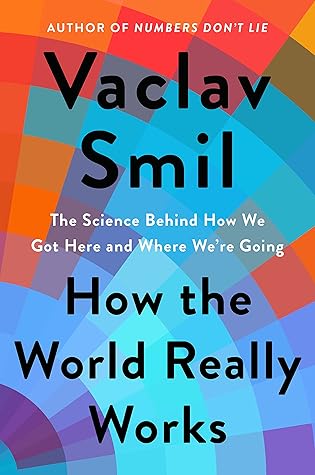More on this book
Community
Kindle Notes & Highlights
by
Vaclav Smil
Read between
August 2 - August 10, 2025
The proverbial best minds do not go into soil science and do not try their hand at making better cement; instead they are attracted to dealing with disembodied information, now just streams of electrons in myriads of microdevices. From lawyers and economists to code writers and money managers, their disproportionately high rewards are for work completely removed from the material realities of life on earth.
Simply put, energy is the only truly universal currency, and nothing (from galactic rotations to ephemeral insect lives) can take place without its transformations.[24]
On January 1 1974, the Gulf states raised their posted price to $11.65/barrel, completing a 4.5-fold rise in the cost of this essential energy source in a single year—and this ended the era of rapid economic expansion that had been energized by cheap oil. From 1950 to 1973 the Western European economic product had nearly tripled, and the US GDP had more than doubled in that single generation. Between 1973 and 1975 the global economic growth rate dropped by about 90 percent, and as soon as the economies affected by higher oil prices began to adjust to these new realities—above all by impressive
...more
Annual global demand for fossil carbon is now just above 10 billion tons a year—a mass nearly five times more than the recent annual harvest of all staple grains feeding humanity, and more than twice the total mass of water drunk annually by the world’s nearly 8 billion inhabitants—and
Many people nowadays admiringly quote the performance gains of modern computing (“so much data”) or telecommunication (“so much cheaper”)—but what about harvests? In two centuries, the human labor to produce a kilogram of American wheat was reduced from 10 minutes to less than two seconds.
Terrorists have always exploited this reality, forcing governments to take extraordinarily costly steps to prevent further attacks while repeatedly neglecting to take measures that could have saved more lives at a much lower cost per averted fatality.
“Thus human beings are now carrying out a large scale geophysical experiment of a kind that could not have happened in the past nor be reproduced in the future. Within a few centuries we are returning to the atmosphere and oceans the concentrated organic carbon stored in sedimentary rocks over hundreds of millions of years.”[47]
The combination of our inaction and of the extraordinarily difficult nature of the global warming challenge is best illustrated by the fact that three decades of large-scale international climate conferences have had no effect on the course of global CO2 emissions.
The country that spends more than half a trillion every year on its military (more than all of its potential adversaries put together) was unprepared for an event that was absolutely certain to occur, and it did not have enough basic medical supplies: investment in domestic production worth a few hundred million dollars could have significantly reduced the economic losses of COVID-19, measured in the trillions![45]


